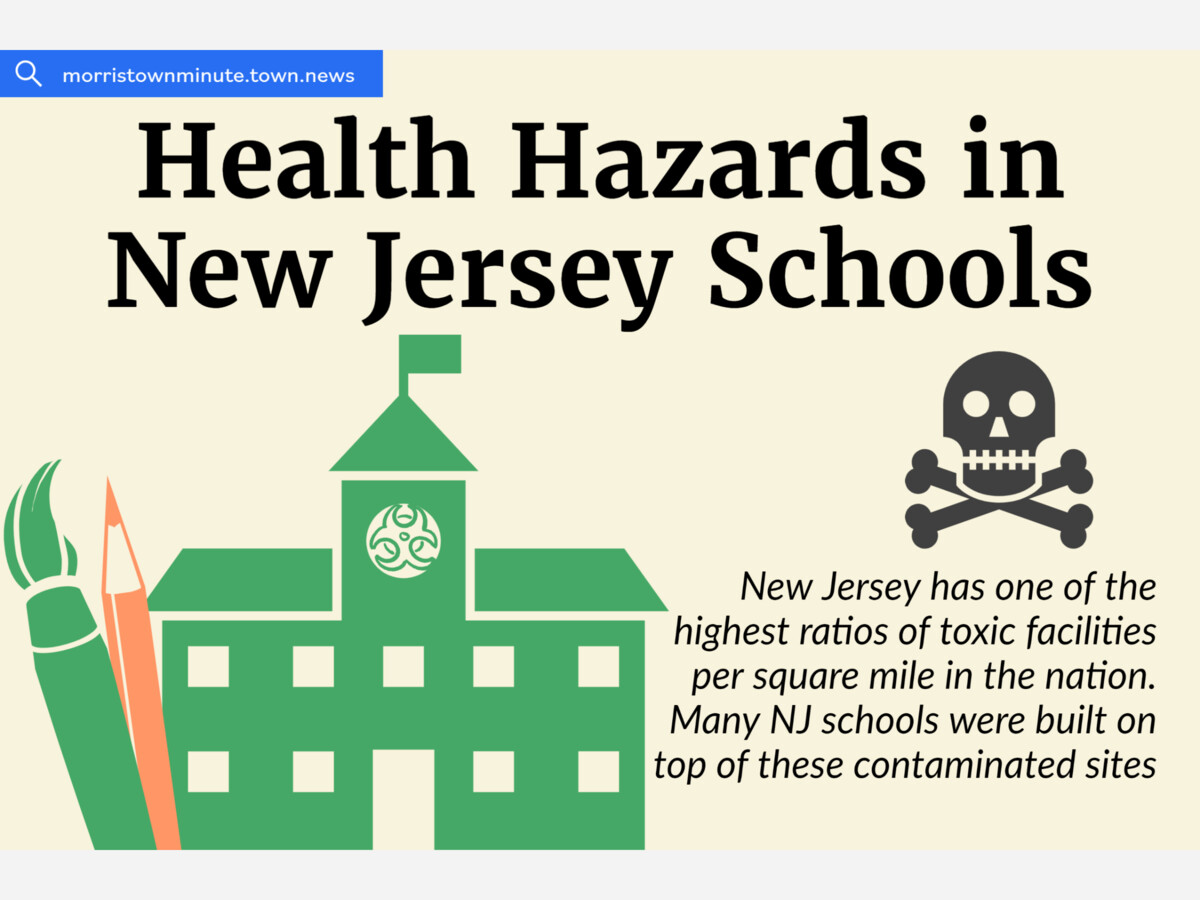Image

New Jersey has over 18,000 known contaminated sites under remediation and tens of thousands of additional sites that completed or are still in the process of cleaning up. Some of our state’s public schools sit on or near these contaminated sites.
Many of New Jersey’s schools, frequently built near industrial areas, railway lines, and highways, are located on contaminated soil. Contaminates can be tracked into the school on feet and clothes and by contaminated air brought in through the ventilation system or open windows and doors.
Schools near highways can be subject to hazardous components from car and diesel exhaust (soot, carbon monoxide, vapors, and acid gases) that cause irritation and diseases to the respiratory system – other components, like benzene, can cause cancer.
These small particles penetrate deep into the lungs making asthma episodes more severe, causing bronchitis, lung cancer, and other respiratory illnesses.
There is no known safe level of exposure to diesel exhaust for children. Retrofits to vehicles and the use of ultralow sulfur fuel help to reduce exposure to toxic diesel fumes and prevent illness.
For schools where idling buses are a problem, families can encourage their school district to ban school bus idling, or at least hold buses to the NJDEP-enforced 3-minute idling limit. The NJDEP encourages school districts to take and sign the “No Idling Pledge.”
This pledge commits that school buses will:
*click on the acronyms (NJDEP, NJDOH, NJWEC) to see each organizations reports on the hazards of artificial turf as well as their recommendations .
Many school districts in recent years have opted for artificial turf/grass on their sports fields instead of natural grass.
A modern artificial field has a several-inch thick layer of “infill” that keeps the blades upright. The infill may include ground-up soles of athletic shoes, silica sand, and/or new thermoplastic or rubber materials, all of which pose safety and health hazards.
Crumb rubber, found in turf fields, contains toxic metals including zinc, lead, arsenic, mercury, cadmium, chromium, latex, and carcinogens such as benzene.
These artificial grass/turf surfaces often heat to 95 to 140 degrees Fahrenheit, contributing to burns, dehydration, and heat exhaustion. Additionally, droppings from dogs, geese, and other animals do not decompose on artificial turf.
A report submitted to the NJDEP from the Environment and Human Health, Inc. and the New Jersey Work Environment Council suggests families be alert to any plans by the school district to convert grass fields to artificial turf and work with staff to see that fields and playgrounds remain grass or are reconverted to grass as soon as possible.
"Environment and Human Health, Inc. (EHHI), a private organization based in Connecticut), citing the Connecticut Agricultural Experiment Station study, challenged the conclusions of previous health risk assessments. EHHI concluded that “…tire crumbs constitute a chemical exposure for humans and the environment…” and that “…health endpoints of concern are numerous, including acute [and chronic] irritation of the lungs, skin and eyes.” EHHI recommended a “…moratorium on installing any new fields or playgrounds…” until more research is done to assess potential exposures and health risks." - Artificial Turf Issues, Report compiled by NJDEP
Polychlorinated BiPhenyls (PCBs) are man-made chemicals widely used in construction materials and electrical products prior to 1978. These chemicals still remain in fluorescent light fixtures and in caulk. As the fixtures deteriorate, they release PCBs. The NJDEP recommends all PCB light fixtures be replaced with new non-PCB fixtures
PCBs can affect the immune, reproductive, nervous, and endocrine systems and are potentially cancer-causing if they build up in the body over extended periods of time.
If caulk containing PCBs is deteriorated or disturbed, it may present a toxic hazard to staff and students. For example, if old windows are replaced the caulk will be disturbed and PCBs may be released into the air.
Not all caulk contains PCBs, and it is not possible to distinguish between non-PCB caulk and PCB caulk without laboratory testing.
The NJ Department of Environmental Protection says that families should be aware of any renovation projects that involve window replacement and demand the caulk be tested before any windows are removed.
If caulk containing PCBs is found in a school, work to remove the health hazard must be done using special protection and care so that PCBs are not released into the air.
Asbestos can be found throughout many NJ schools in products like roofing shingles, floor and ceiling tiles, cement pipes, and insulation for boilers.
Asbestos fibers are considered relatively safe when they are firmly bonded or compacted within other materials, such as floor tile. However, when asbestos-containing materials are loose or crumbling due to aging, water damage, abrasion, or construction, microscopic fibers are released into the air that can cause cancer when inhaled.
The primary source of lead in schools is deteriorating paint. Paint can become a health hazard when damaged due to aging, abrasion, poor maintenance, water damage, renovation, and construction.
Renovation can release lead particles, especially if the renovations involve breaking through and disturbing a lead-painted wall or ceiling, or if layers of paint are removed through sanding.
Mental health problems, nervous system and kidney damage, and anemia are all among the many adverse health effects of lead exposure.
The New Jersey Department of Environmental Protection suggests families call the Healthy Schools Now Coalition phone number at (609) 882-6100 for direct help with concerns about toxic substances in their school and any other health and safety organizing issues.
Learn more about the hazards of artificial turf from the NJ Department of Health
Follow Morristown Minute on Instagram, and Twitter for more local and state updates.
Find more information about artificial turf here: https://www.nj.gov/health/ceohs/documents/eohap/haz_sites/regional_stat…
More on the hazards of artificial turf here
https://morristownminute.town.news/g/morristown-nj/n/76266/hazards-arti…